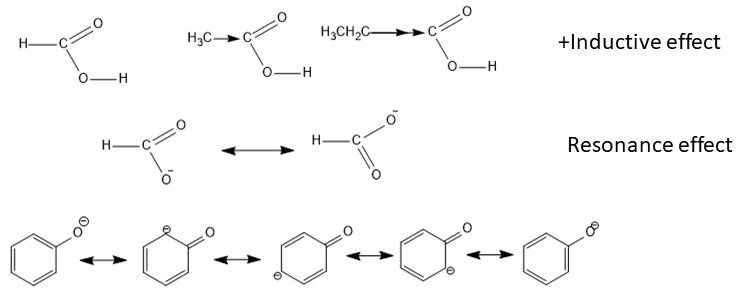Question
Question: Among formic acid, acetic acid, propanoic acid, and phenol, the strongest acid in water is- [A] Fo...
Among formic acid, acetic acid, propanoic acid, and phenol, the strongest acid in water is-
[A] Formic acid
[B] Acetic acid
[C] Propanoic acid
[D] Phenol
Solution
To solve this question, approach using the factors that affect the acidity of an acid in a solvent. Consider the strength of the bond that is being broken and also consider the strength of the ions formed.
Complete step by step answer:
In the question, three of the given acids are carboxylic acids. Let us see their strength first and then compare them with phenol.
Now, let’s discuss the carboxylic acids-
In the case of carboxylic acids, a positive inductive effect (+I-effect) is present due to the electron-donating tendency of alkyl groups. The +I effect increases with the presence of a higher number of alkyl groups.
This +I effect reduces the acidity. This happens because the +I effect will increase the electron density on carbonyl carbon and thus it reduces the C-O bond polarity. This results in relatively increased O-H bond strength. Thus, due to the increased bond strength it is difficult to furnish the hydrogen ions (property of an acid is the ability to donate the hydrogen ions) and it is responsible for making it less acidic.

So, we can say among all given alkyl carboxylic acids, the one with the least alkyl group will be more acidic.
Formula of acetic acid is CH3COOH that of propanoic acid is C2H5COOH and formic acid is HCHO.
Therefore, we can see that formic acid is the least alkylated. Therefore, the order of acidity of these three carboxylic acids will be - HCHO>CH3COOH>C2H5COOH
Now, let’s compare formic acid and phenol-
Here, formic is a stronger acid because the delocalization of negative charge after losing proton is more delocalized in formate ions on two oxygen atoms.
Whereas, in phenoxide ion, we can see oxygen being more electronegative will always have higher charge density even after ring delocalization.
In conclusion, formate ions have more powerful resonance compared to phenoxide ion.
Hence, we can say that formic acid is strongest in water.
So, the correct answer is “Option A”.
Note: We have known several theories which explain the concept of acid and bases to us like Arrhenius Theory, Solvent System Theory and many more. These theories explain acid and bases in different ways. In the discussion above we have dealt with the Bronsted Lowry Theory.
Bronsted Lowry theory is also known as the protonic theory because it explains the concept of acid and bases on the bases of a proton or hydrogen ion orH+.
According to the Bronsted Lowry theory, “any species that tends to give up a proton (hydron) is an acid, and any substance that tends to accept a proton (hydron) is a base.”
